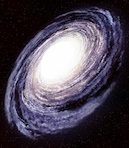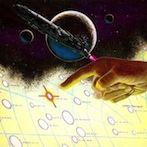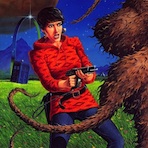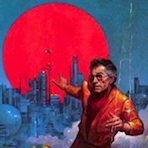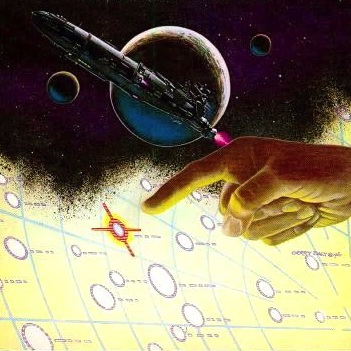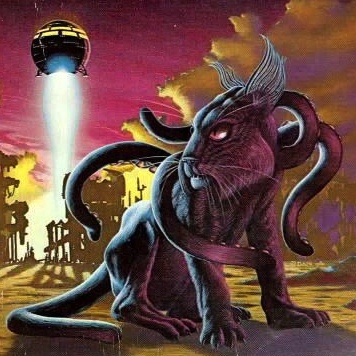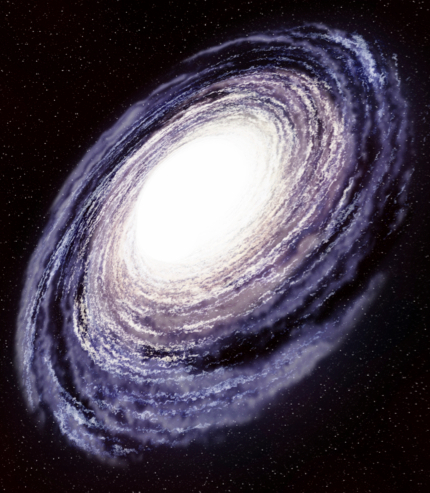In the 2005 interview in "Aberrant Dreams," Al Reynolds, the popular Welsh author of new space opera, when compared to A. E. van Vogt, answered that:
"There was not a huge amount of science fiction books accessible to me when I was a kid. One of the books I did have was a collection of van Vogt's short stories, which was called Destination Universe and I read that over and over again. That collection had "Far Centaurus," "A Can of Paint," "Dear Pen Pal" and "The Sound" which were very weird and strange to me when I read it, but I kept coming back to it because I found it so intoxicating."
And then went on:
"I have this book by Damon Knight, a collection of critical essays, and Knight really trashed van Vogt very publicly. He was really damning. Do you think his career ever really recovered from that?"
In the SF world, the impact of this article, "Cosmic Jerrybuilder" (I refer to this article as it appeared in the 1967 edition of In Search of Wonder) was largely widespread, as can be seen from the above quote. But the article itself, if read today, reads like a very bad fix-up between two articles on The World of Null-A and some others discussing van Vogt's works. I doubt that, standing by itself, an article so disjointed would have been published. But this can be my personal bias against Knight and so it is not relevant.
In "Cosmic Jerrybuilder," Knight states he will examine World of Null-A from four points of view — Plot, Characterization, Background, and Style.
Later in the article, he arrives at three statements which sum up his criticism of van Vogt's work in general:
- His plots do not bear examination.
- His choice of words and sentence-structure are fumbling and insensitive.
- He is unable to visualize a scene or to make a character seem real.
I'll try to refute first the four criticisms of World of Null-A, and then the three more general assessments.
The preliminary problem in examining this, is that the main body of the criticism is centered on the magazine version of World and Knight is forced to admit that much was left out from the book edition, which is a feeble excuse. However, let's examine the single points:
The plot of World "abounds in contradictions." The plot of World — I refer to the 1948 book edition — is accelerated by the means of a profound and large cutting and is clearly a dream plot, in which all changes abruptly. Knight fails to see this.
Characterization: the same. For Knight the characters do not act in a rational way. This is not a mystery novel in which all the pieces of the puzzle must combine themselves in a larger scheme. This novel is exactly the opposite: it depicts a shifting and menacing reality in which nothing is what it seems...
Background: here, Knight is plainly wrong. Van uses "General Semantics" as a background. When I read World for the first time in Italian in 1963, I happily knew nothing of Korzybski, and so admired Van for creating a real "future philosophy." This is the effect the book still exerts on me: a truly different culture. The technological gadgets are irrelevant.
Style: again nearly all the examples are from the magazine edition and moreover Knight seems unaware that van Vogt is trying to create a sort of chock for the reader. For example, the sentence "His brain was turning rapidly in an illusion of spinning" — which Knight ridicules — seems to me very apt and stimulating. It is true that the magazine version is careless in the writing, but the book version is not.
Perhaps at this point, it becomes useful to quote from Paul Di Filippo's review of the big anthology of Van's stories, "Transfinite." For Di Filippo, van Vogt was seen by Knight:
"... as a ham-handed prosodist, ignorant of 'real' science and given to fantastically abstruse plotting. Van Vogt's popularity was supposed to stem from some kind of occult aura around his work, as if van Vogt himself were one of the mind-clouding supermen he liked to write about, luring readers into his ambit with gaudy yet shabby illusions. Well, a sympathetic and close reading of the stories in this current volume will reveal that this portrayal is an unfortunate sham. Van Vogt knew precisely what he was doing in all areas of his fiction writing. There's hardly a wasted word in his stories: characters are delineated with sharp strokes, and actions conveyed economically and with meticulous precision, forming striking visual images in the reader's mind. His plots are marvels of interlocking pieces, often ending in real surprises and shocks, genuine paradigm shifts, which are among the hardest conceptions to depict."
I have some doubts on the "interlocking pieces," but I heartily subscribe to all the rest.
And now we come to the three final points enunciated by Knight against van Vogt:
Point 1 would be true if van Vogt were a mystery writer, such as Agatha Christie. Because he was clearly not, the point is void.
Di Filippo has shown better than me that point 2 is eminently debatable. Try this:
"The black, moonless, almost starless night yielded reluctantly before a grim reddish dawn that crept up from the left."
Or this:
"Across the miles and the years, vague patches of light gleamed coldly at him, whole galaxies of blazing stars shrunk by incredible distance to shining swirl of mist."
Or, again, this:
"He woke to the sound of a violin. It was a sad-sweet music that told of the rise and fall of a race long dead."
Or, finally, this:
"Indecision was dark on the man's thoughts as he walked across the spaceship control room to the cot where the woman lay, so taut and so still. He bent over her. He said with his deep voice: 'We are slowing down, Merle.'"
"Fumbling and insensitive"? I think not.
Point 3 can be refuted by referring again to "Black Destroyer," the first story published by Van in 1939:
"Mist of memory stopped that mad rush when it was still only electricity singing through his muscles. Memory that brought fear in an acid stream of weakness, pouring along his nerves..."
"A tremor of dismay shot through him. The dim red sun toward which he was heading was not growing larger. It was becoming smaller by the instant."
"His tentacles clutched at precious instruments and flung them insensately; his paws smashed in fury at the very walls of his ship."
"They found him lying dead in a little pool of phosphorus."
"It was history, honorable Mr. Smith, our knowledge of history that defeated him."
Then, what remains of the Knight's "thrashing"? I think the effect was bigger because, in a small field, this was one of the first attacks on a popular work. Of this article, very little remains. Only some pregnant and creative images, like this:
"Altogether, it is a strange world that van Vogt wanders in. A dark and murky world [...] and every hero packs a .32 caliber improbability in his hip pocket."
Nice phrasing, but no substance.
Before concluding, let's hear some other opinion on Van's work.
Al Reynolds again (same source):
"The thing about the van Vogt article is that Knight attacks The World of Null-A on a logical level and he finds lots of logical plot holes in it and things that just do not make any sense. It's clear, I think, that he is just missing whatever worked in that book for van Vogt's readers. I mean he's just not getting what van Vogt was doing right for so many people."
And now, Phil Dick (interviewed in Vortex, February 1974):
Q: What about Damon Knight's famous article criticizing van Vogt?
A: Damon feels it's bad artistry when you build these funky universes where people fall through the floor. It's like he's viewing a story the way a building inspector would when he's building your house. But really reality is a mess, and yet it's exciting. The basic thing is: how frightened are you of chaos? And how happy are you with order? Van Vogt influenced me so much because he made me appreciate a mysterious chaotic quality in the universe which is not to be feared.
I have read somewhere that Knight, much later, regretted in some way his article, saying he did not know van Vogt was trying to create a dream atmosphere in his work.
Not understanding the aims of an author is the mark of a bad critic. And Knight was one of them.
